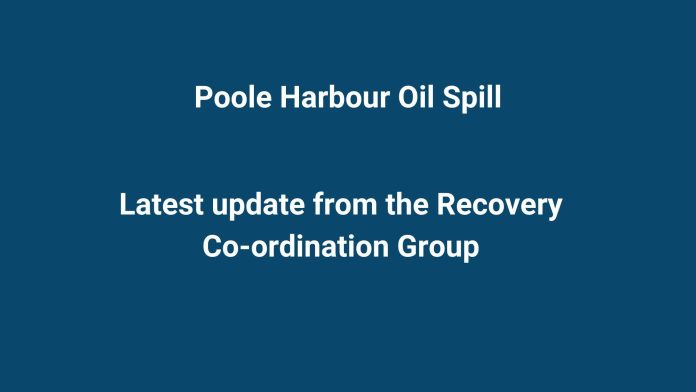As the one-year anniversary of the oil spill at Poole Harbour approaches, two reports have been published that look at the incident, the clean-up operation, and the local impacts of the spill.
A report into the incident, undertaken by consultants Hatch, and commissioned by Dorset Council and BCP Council on behalf of the Recovery Co-ordination Group (RCG), highlights the actions taken by all agencies that ensured the leak was contained to prevent long-lasting contamination. It also notes that the impacts on the local area through health and community, the environment, local business, and the economy were very limited.
A further report on the environmental impacts of the incident has been put together by the multi-agency Monitoring Coordination Cell (PMCC), led by CEFAS and the Environment Agency. The summary of this report has now been published along with the Hatch report.
On 26 March 2023, Perenco UK reported an estimated loss of 200 barrels (approximately 31,600 litres) of reservoir fluid from their Wytch Farm site on Poole Harbour, consisting of 15% crude oil and 85% production fluid. The Wytch Farm Oil Spill Contingency Plan and Poole Harbour Oil Spill Contingency Plan were both instigated, and a multi-agency response was declared.
Due to the quick action of all partners and the initial clean-up operation, there have been no reports of oil outside of the contaminated area in Ower Bay since 5 April 2023.
Following this, focused localised clean-up at the release site and coordinated monitoring and assessment of the immediate environment and Poole Harbour have been carried out.
Investigation and monitoring work performed during 2023 identified impacts on the saltmarsh and reed habitat within a limited area of the southern creek in Ower Bay.
A remediation strategy for this localised contamination was developed. This involved the removal of contaminated material from a focused location in the upper area of the creek next to the release site, through controlled scraping and the removal of sediment and organic matter to allow the habitat to recover. This also removed the possibility of recontaminating the wider area in the future.
Remediation works continued, subject to tidal conditions, until early January 2024. During these works, every effort was made to limit the impacts of the activities on the features of the area, and all necessary wildlife surveys were conducted before works took place to limit impacts on local species.
Following the completion of this remediation activity, there has been a programme of sediment and surface water monitoring and analysis. This analysis has confirmed that the remediation activity has been successful and that there is no longer contamination in the southern creek area of Ower Bay that presents a risk to the wider Poole Harbour Area.
Both reports are available to view on the Poole Harbour Commissioners website.
Further monitoring of the site during 2024 and 2025 will be ongoing to assess the continued recovery of the site.
If you like our content, join us in helping to bring reality and decency back by SUBSCRIBING to our Youtube channel: https://www.youtube.com/channel/UCQ1Ll1ylCg8U19AhNl-NoTg AND SUPPORTING US where you can: Award Winning Independent Citizen Media Needs Your Help. PLEASE SUPPORT US FOR JUST £2 A MONTH https://dorseteye.com/donate/







